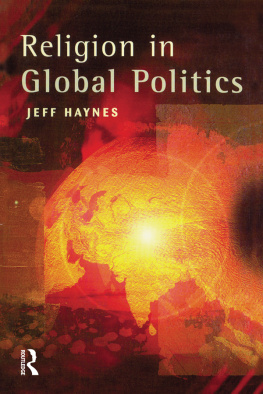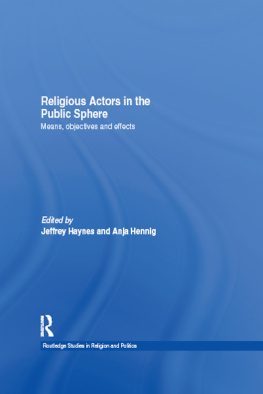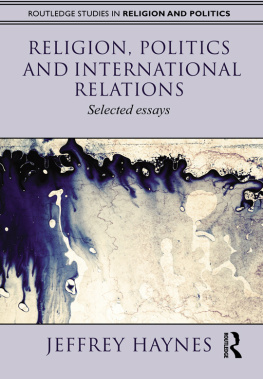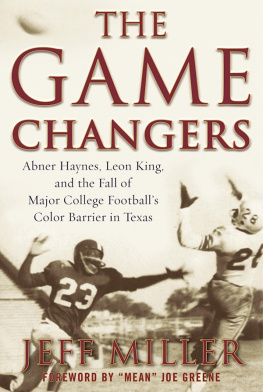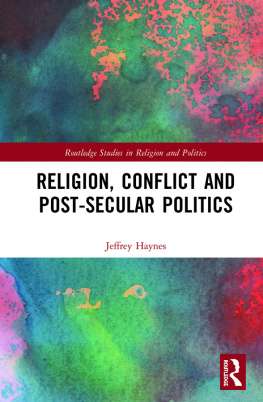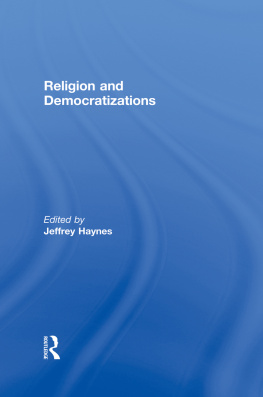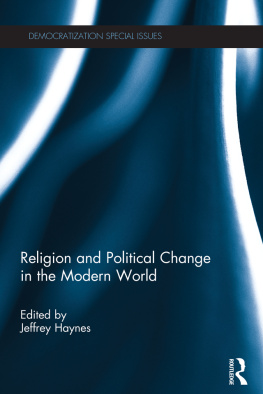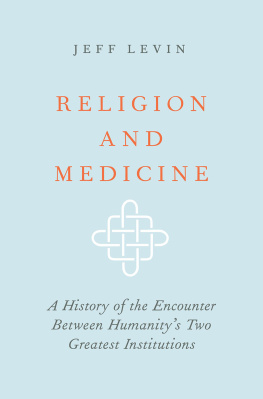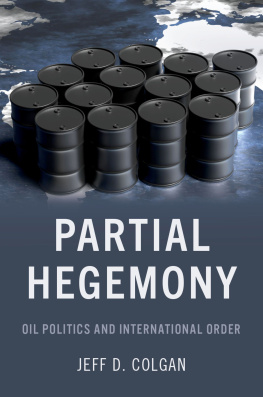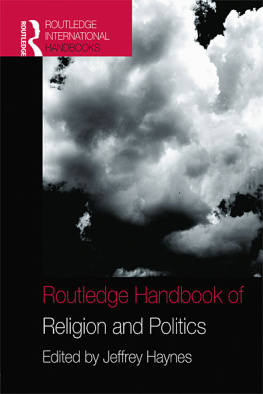First published 1998 by Pearson Education Limited
Published 2014 by Routledge
2 Park Square, Milton Park, Abingdon, Oxon OX14 4RN
711 Third Avenue, New York, NY 10017, USA
Routledge is an imprint of the Taylor & Francis Group, an informa business
Copyright 1998, Taylor & Francis.
The right of Jeff Haynes to be identified as author of this work has been asserted by him in accordance with the Copyright, Designs and Patents Act 1988.
All rights reserved. No part of this book may be reprinted or reproduced or utilised in any form or by any electronic, mechanical, or other means, now known or hereafter invented, including photocopying and recording, or in any information storage or retrieval system, without permission in writing from the publishers.
Notices
Knowledge and best practice in this field are constantly changing. As new research and experience broaden our understanding, changes in research methods, professional practices, or medical treatment may become necessary.
Practitioners and researchers must always rely on their own experience and knowledge in evaluating and using any information, methods, compounds, or experiments described herein. In using such information or methods they should be mindful of their own safety and the safety of others, including parties for whom they have a professional responsibility.
To the fullest extent of the law, neither the Publisher nor the authors, contributors, or editors, assume any liability for any injury and/or damage to persons or property as a matter of products liability, negligence or otherwise, or from any use or operation of any methods, products, instructions, or ideas contained in the material herein.
ISBN 13: 978-0-582-29312-0 (pbk)
British Library Cataloguing-in-Publication Data
A catalogue record for this book is available from the British Library
Library of Congress Cataloging-in-Publication Data
A catalogue record for this book is available from the Library of Congress.
Set by 35 in 10/12pt Times
Chapter 1
Introduction
Examples of religions recent political impact abound in countries at varying levels of economic and political development. For example, there is the crucial role of Christian Churches in the Third Wave of democracy in southern and eastern Europe, Latin America and Africa from the early 1970s; the overthrow of the Shah of Iran in 1979 and the contemporaneous growth of Islamist movements across the Muslim world from Morocco to Malaysia; the New Christian Right in the USA demanding fundamental political, social, and moral changes; long-running hostility between Protestants and Catholics in Northern Ireland and between Muslims and Christians in Africa; Hindu and Sikh political radicalism in India and Buddhist activism in South-east Asia; and Jewish extremism in Israel. The result is that, around the world, the mass media, social scientists, professional politicians and many ordinary people feel compelled to pay increased attention to religion as a socio-political actor.
Religious organizations of various kinds seem openly to be rejecting the secular ideals dominating national policies, appearing as champions of alternative, confessional options. In keeping faith with what they interpret as divine decree, increasingly they refuse to render to non-religious power either material or moral tribute. They are increasingly concerned with political issues, challenging the legitimacy and autonomy of the primary secular spheres, the State, political organization and the market economy. They are also refusing to restrict themselves to the pastoral care of individual souls, instead raising questions about, inter alia , the interconnections of private and public morality and the claims of states and markets to be exempt from extrinsic normative considerations. Intent on retaining social importance, many religious organizations seek to elude what they regard as the cumbersome constraints of temporal authority, threatening to usurp constituted political functions. In short, refusing to be condemned to the realm of privatized belief, religion is once again reappearing in the public sphere, thrusting itself into issues of moral and political contestation. (Religious privatization means that religious organizations shall not have the right to be actively engaged with matters of public concern or to play a role in public life.) As Casanova (1994: 6) puts it, what was new and became news in the 1980s was the widespread and simultaneous refusal of the so-called world religions that is, Islam, Christianity, Hinduism and Buddhism to be restricted to the private sphere.
This book examines the relationship between religion and politics since the early 1970s in a variety of countries. Its title, Religion in Global Politics , aims to capture its goal, a general survey of the interaction of religion and politics in four regions: the Americas, Europe, Asia and Africa. Because this is obviously an ambitious task for one book, it cannot hope to be definitive. Nevertheless, by focusing on key issues, I seek to provide a commentary on what has taken place, and is currently happening, to the spheres of religion and politics throughout the world. Most chapters feature case studies of several countries, providing specific geographical foci to put empirical flesh on the theoretical bones outlined in the introduction. Overall, the aim is to offer a comparative treatment so that the reader can appreciate some of the rich variety of particular national situations involving religion and politics since the early 1970s.
Given the range of religious traditions that is, the world religions and countries examined, it is necessary to establish at the outset what will and will not be focused upon. I am primarily concerned with the political relationships between states and leading religious institutions and organizations. Sometimes as for example in Europe and the Americas the main religious actors are various Christian Churches, while elsewhere for example, the Middle East and Asia non-Christian religions are the main focus. I do not focus on transnational religious actors except where they impact upon the domestic scene, as in Central Asia.
The principal argument of the book is that religion is leaving, or refusing to accept, its assigned place in the private sphere. This is true, I believe, even in highly secular societies like England where mainline Christian Churches have re-emerged as important social, moral and to a degree political voices. There, building on a tradition established during the premiership of Margaret Thatcher in the 1980s, the publication in October 1996 of the Catholic Churchs 13,000-word pamphlet, The Common Good and the Catholic Churchs Social Teaching , was an important intervention in the political debate between the Labour and Conservative parties. Politicians especially of the latter party saw it as an endorsement of Labours policies. Six months later in April 1997 11 Churches collectively published a further report entitled, Unemployment and the Future of Work, an outspoken attack on the inability of the main parties in Britain to focus upon the amelioration of the suffering of the underprivileged. The report accused them of putting tax cuts before solutions to poverty and unemployment in the battle for victory in the May 1997 general election (Bellos and White 1997).
Concerned with overtly political issues, The Common Good and Unemployment and the Future of Work were both manifestations of the contemporary process of repolitization of the hitherto increasingly private religious and moral spheres in England. The reports repesented an attempt to re-establish ethical norms of behaviour and activities in public and political spheres and to present a political case for so doing. In the publications, mainline Churches endorsed what were clearly political goals, expressing opposition to the dualism between religion and politics, and arguing that the concerns of social justice were, in fact, not only scripturaily rooted, but also wedded to the defence of liberal democracy, pluralism and the market economy (Watson 1994: 149, Huntington 1991, 1993). In short, the central issue for the Churches was the degree to which the consumerist version of politics should be modified or balanced by the social dimension (Edwards 1990, Glasman 1996).

